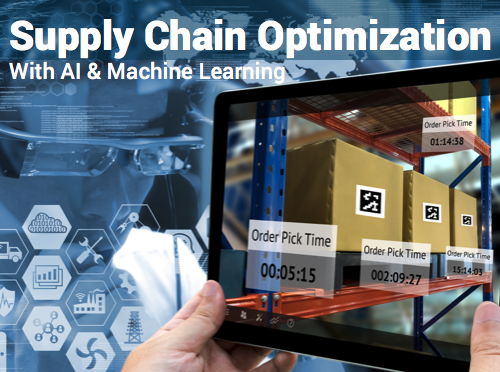Make Faster & Smarter Decisions with Machine Learning
Blog: Enterprise Decision Management Blog

Optimization of supply chain operations has become an imperative, as organizations grapple with customer demands, unpredictable events, and spiraling costs. On top of these persistent challenges, complexities are magnified by the myriad of tools required to manage everything from workforce schedules to resource allocation. To meet competitive demands, business decisions are needed quickly and accurately against an ever-evolving list of requirements and dependencies.
But all too often, supply chains break down in the face of unanticipated factors or messy and incomplete data. To drive greater speed and precision in the supply chain, industry leaders are employing automation technology and visual insight capabilities. This traditional software driven approach can help but does not always suffice in the face of a growing number of variables and constraints. Today, many companies are transforming their supply chain challenges into business opportunities with powerful analytic platforms rooted in Artificial Intelligence and Machine Learning.
Machine Learning is founded on the principle of applying algorithms to data to identify patterns and ultimately use the data to derive predictive models. A machine learning engine does not rest; it continues to monitor data over time and essentially the “machine learns” to predict best outcomes based on data patterns. In supply chain applications, this means vast volumes and any variety of data can be consumed to find incremental prediction across previously unassailable data surrounding the supply chain process.
Properly applied, Machine Learning can significantly improve understanding of influences and variable factors that might have previously been overlooked. Within any supply chain operation, there are countless variables which have multifaceted operational dependencies and may experience complications through frequent yet unexpected moderations. Each dependency is subtly intertwined throughout the entire cycle. Machine Learning has proven an effective means of managing these inputs and interruptions into more predictable outcomes that can both predict and guide substantial improvements for the business.
Artificial Intelligence, much like Machine Learning, is predicated on the use of a vast and variety of data input whereby it learns over time exploring new data associations and becomes self-adaptive. Ideally suited for predicting behavior, both human and systems, it is useful for exploring elements of the supply chain that are not yet well understood or that need to evolve over time.
The dimensions over which utilizing Machine Learning and Artificial Intelligence can be applied to supply chain management are numerous, but two commonly elusive areas of application include the prediction of maintenance failure and human behavior. The influence of just these two factors alone can have enough impact to be compelling. Our experience partnering with organizations and their numerous solutions across various supply chain needs has exposed many diverse and impactful applications.
Least you become concerned at this point by the suggestion that Machine Learning and Artificial Intelligence take over the supply chain management process, these are incremental tools to ingest, assess, and inform. What will set businesses apart however is how the organization uses the valuable insights they offer and leverage them for ongoing smarter outcomes. This necessitates that to be effective Machine Learning and Artificial Intelligence must be placed into the hands of the business expert as a tool to guide and improve, not assume control. We have experienced that inculcating them into a business processes with a rich set of visualization capacities and the ability to explore “what if” scenarios coupled with outcome analysis can be transformational to business outcomes. Enabling this is a critical consideration before you embark into the Machine Learning and Artificial Intelligence world
Machine Learning and Artificial Intelligence are indeed transforming the way most businesses conduct digital processes, but supply chain optimization is arguably one of the most dynamic use case. We have seen customers gain immediate return on investment by simplifying and streamlining critical processes within the supply chain. We have also seen significant improvements made to longer-term productivity and profitability. Instead of considering niche solutions based on specific and immediate needs or rip-and-replace existing investments, organizations should tackle faster, smarter decisions across the supply chain that Machine Learning can swiftly provide.
This post originally appeared in Supply Chain World.
The post Make Faster & Smarter Decisions with Machine Learning appeared first on FICO.
Leave a Comment
You must be logged in to post a comment.







